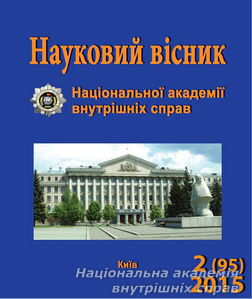As for the legal regulation of operational activities of police
Keywords:
Criminal Procedural Code of Ukraine, operatively-search activity, tacit (search) investigative measures, objectives of operational activities, legal regulation
Abstract
It has been shown that adoption of the new Criminal Code of Ukraine on 13th of April 2012, despite introducing some positive innovations (control devices for human rights protection, time reduction for the pretrial and trial processes, expanding the list of activities for facilitating criminal procedure, establishing a jury trial, etc), overall, had a negative impact on effectiveness of detective work, which is a socially useful form of the state law enforcement activity. Replacing detective activities with secret investigative actions has taken away the traditional role of detective work as accompanying criminal procedure. Due to imprecise formulation of the law, legitimacy of performing detective activities prior to criminal procedure appears doubtful, and thus detective work loses its forestalling. In detective practice, some principles (such as adequacy of detective reaction to the level of social threat posed by a particular crime, thoroughness and objectiveness of investigation of the circumstances of the crime, or interaction with government bodies, local authorities and the public) are not strictly adhered to. Thus the loss of procedural perspective of the results of detective activities, that are performed outside of criminal procedure, leads to lower resistance of detectives to negative influence of the criminal environment. Moreover, the majority of tasks defined for detective work in the current legislation (detecting and preventing crimes, tracing missing persons, etc) lie outside the tasks of criminal procedure and are independent of it. Among known to science forms of detective work, only half can be realized during criminal procedure. The number of secret investigative actions introduced by the new Criminal Code of Ukraine is far above the number of corresponding rights of the detective bodies with regard to performing detective activities allowed by Ukrainian law; and there is no objective reason for that, taking into account the necessity of fighting organized and violent crime, corruption and terrorism. According to the current legislation, the detective bodies can only perform detective activities within criminal procedure and on an investigator’s instructions; and such activities are mainly not related to the necessity of restricting individual rights. Such limitation of the rights of the detective bodies appears unjustified. Thus, additional authority given to investigators combined with noticeable limitation of the rights of the detective bodies, which the new Criminal Code of Ukraine has brought about, overall, does not favour effectiveness of detection and prevention of crime in our state.Downloads
Download data is not yet available.
Abstract views: 131 PDF Downloads: 105
How to Cite
[1]
Orlov, Y. 1. As for the legal regulation of operational activities of police. Scientific Herald of the National Academy of Internal Affairs. 95, 2 (1), 162-176.
Issue
Section
Law enforcement activities
- Authors reserve the right to authorship of their own work and transfer to the magazine the right of the first publication of this work under the terms of the Creative Commons Attribution License, which allows other persons to freely distribute published work with mandatory reference to authors of the original work and the first publication of an article in this magazine.
- Authors have the right to enter into separate additional agreements on non-exclusive dissemination of the work in the form in which it was published in the journal (for example, to post an article in the institution's repository or to publish as part of a monograph), provided that the link to the first publication of the work in this journal is maintained.
- The journal's policy allows and encourages the posting of articles by authors on the Internet (for example, in electronic storehouses of institutions or on personal websites), both before the submission of this manuscript to the editorial office and during its editorial processing, as this contributes to the creation of a productive scientific discussion and positively affects the efficiency and dynamics of citing the published work.




